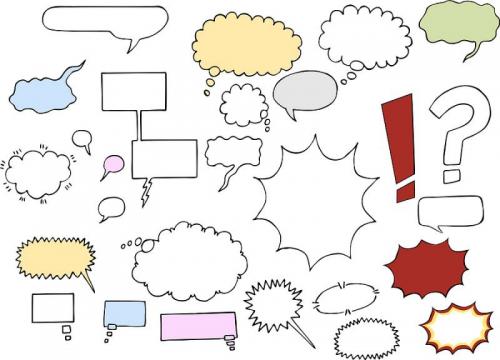
Hearing voices and thought insertion
It’s not that commonly known outside psychiatry that medication designed to make you better from psychosis actually starts off by making you worse. These are known as “paradoxical symptoms or side effects” and in my case the day after I was sectioned and started on an anti-psychotic, I started to hear voices (medical term – “auditory hallucinations”).
These were friendly and helpful at first:
“Poor boy!”
“He’s not a bad lad …”
I was actually well aware that these were voices and told my parents and the ward staff about them. It just went to confirm my diagnosis – acute psychotic episode. But shortly after, things turned nasty, and the voices became foreign and commanded me to do things. Nothing harmful to others, you understand, but it was terrifying. My journal from this time records that:
“Louise, a patient, scribbled something upside down as we were chatting at the dining room table. The next day I awoke hypnotised to walk around the ward, with someone shouting in a foreign language and my body responding by feeling a force dragging me round the ward. This continued for quite some time.”

Then the voices became silent. This is called “thought insertion” and by this stage, whilst I recognised I was extremely unwell, I believed that the security services had caused my psychosis through harassment, medication and secret overnight hypnosis, and that they had control of my brain.
I was commanded to stay inside my ward en-suite room all night one night even though medication was keeping me awake all night most nights – a common side effect during titration of anti-psychotics (gradual tapering in of the dose). I had commands to kill myself and I will talk more about this in a moment.
There is a related phenomenon called “thought broadcasting” whereby I was convinced also that a monitoring device in the light above my bed was able to detect what I was thinking and relay this to MI5. Clearly, this was incredibly frightening and soon I began to think that my life was in danger. I believed that all the patients had been “nobbled” by MI5 and that the staff were working for them. One of the more unhelpful SHOs around that time told me: “Ian, it’s not just journalists whom MI5 vet: they vet psychiatrists too”. I think this was a reality test – I don’t think he was being serious. But I believed it at the time, and it scared the life almost literally out of me – I became acutely suicidal and when I got home leave for three days I had to return to the ward within hours because I had such strong compulsions to die. This, naturally, I attributed to security services again, as persecution for bringing back to life the Observer newspaper stories of 1985 about the BBC and vetting.

The Official Secrets Act prevents me from saying any more on this subject other than that there is absolutely no evidence this still happens today published in any medium since 1989. Yes there are stories quite regularly in the quality press about the fact it used to happen. But as far as published evidence, there isn’t any, but it would be illegal to publish any anyway so there never is going to be. It’s this level of doubt which remains over me in CBT therapy to this day. My brilliant NHS CBT therapist always says: “Ian, I’m not here to tell you whether your beliefs are true or not – just to help you get through your symptoms day to day.” We both agree that there is no evidence, and CBT therapists like to deal in evidence. And journalists do too. So there we are – we will never actually know for sure but, as far as I can say and from what I have read, it doesn’t.
And if I did, I couldn’t tell you anyway, or at least, as my BBC producer put it to me when the police blocked me from running a top-secret story once: “I could tell you but then I’d have to kill you!” Thank you Laura. Most helpful during my recovery that statement. I will never forget you said that … nor that a colleague tipped me off about a top-secret story at a time I was just beginning to suspect that the BBC has taken over, from MI5, the role of vetting its staff for subversive and pacifist or left-wing tendencies!
I also get a phenomenon, which none of my NHS team can remember the medical term for, whereby I mishear what others around me are saying, often in public and under stress, and this is a lot like hearing voices. I may think people have been calling me a "schiz" or saying "he's started to hear voices again" but the context later makes it obvious that if, e.g., even I didn't know I was going to be in a particular location at a given time, and I'm quite unpredictable, then how could they be saying those things to me?! I recently thought somebody called me "the cheese guy" because I am veggie and was having a meal in a pub with my parents.
I have been asked to point out by my CBT therapist, who reads this blog, that there is “no cure” for schizophrenia, nor for ME/CFS, and that I will probably have delusions and ongoing fatigue for life. And at times of distress I will continue to mishear things. But the way she has allowed me to cope with these on a daily basis, and her predecessor in the third sector, has been astonishing. I am attempting my first completely unsupported trip into a major city in 8 years this week … OK so I will be supported throughout my editorial meeting and have lunch there first, but to cope with the hugely demanding journey from where I live into central Manchester alone on public transport shows just how far I have come.
And as for the voices … I haven’t heard one in years. Thought insertion … yes, I still get that at times of crisis and I get compulsions to die still, but I’m still alive aren’t I? And proud to be a mental health and disability journalist and blogger too!
For more information on voices and antipsychotics
SANE - Schizophrenia fact sheet
sane.org.uk/how_you_can_help/through_your_eyes/story/124
rethink.org/document.rm?id=682
rethink.org/document.rm?id=664
Some other helpful internet links
hearing-voices.org/index.html
madnotbad.co.uk/





Comments
Hi Ian, very very best wishes for your trip - big step! Well done - even getting to the point where you can attempt such a trip is wonderful.
Charlotte
Hi Charlotte. Your kindness is greatly appreciated. I had a slightly eventful journey again but managed it solo and had a great supported editorial meeting. The magazine in question has commissioned two features and my regular column for the next issue and the team are all fantastic.
It's such a privilege to be a mental health and disability journalist. And amazing to work and blog for Mental Healthy! I took me 8 years stop grieving over my BBC radio career and move on. How glad am I with how things have worked out!
Cheers again for your support. Ian
Post new comment